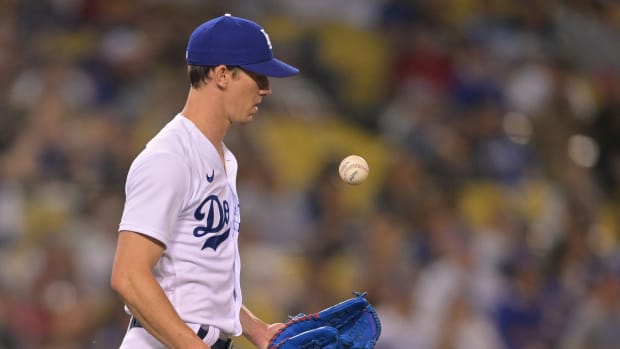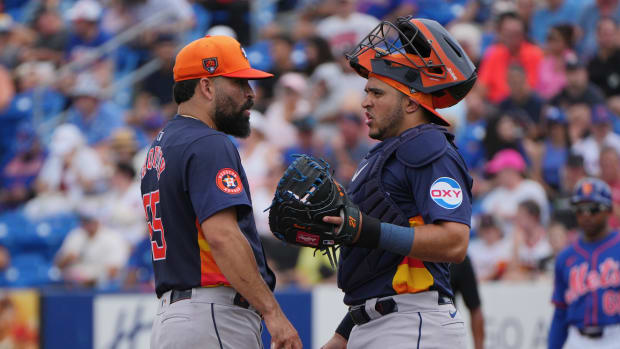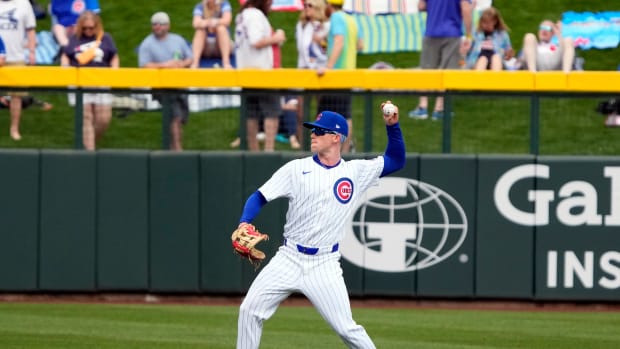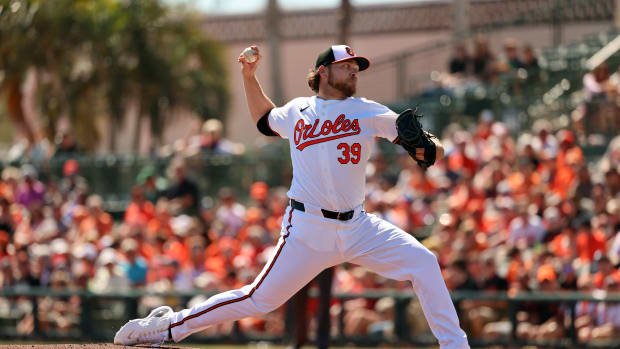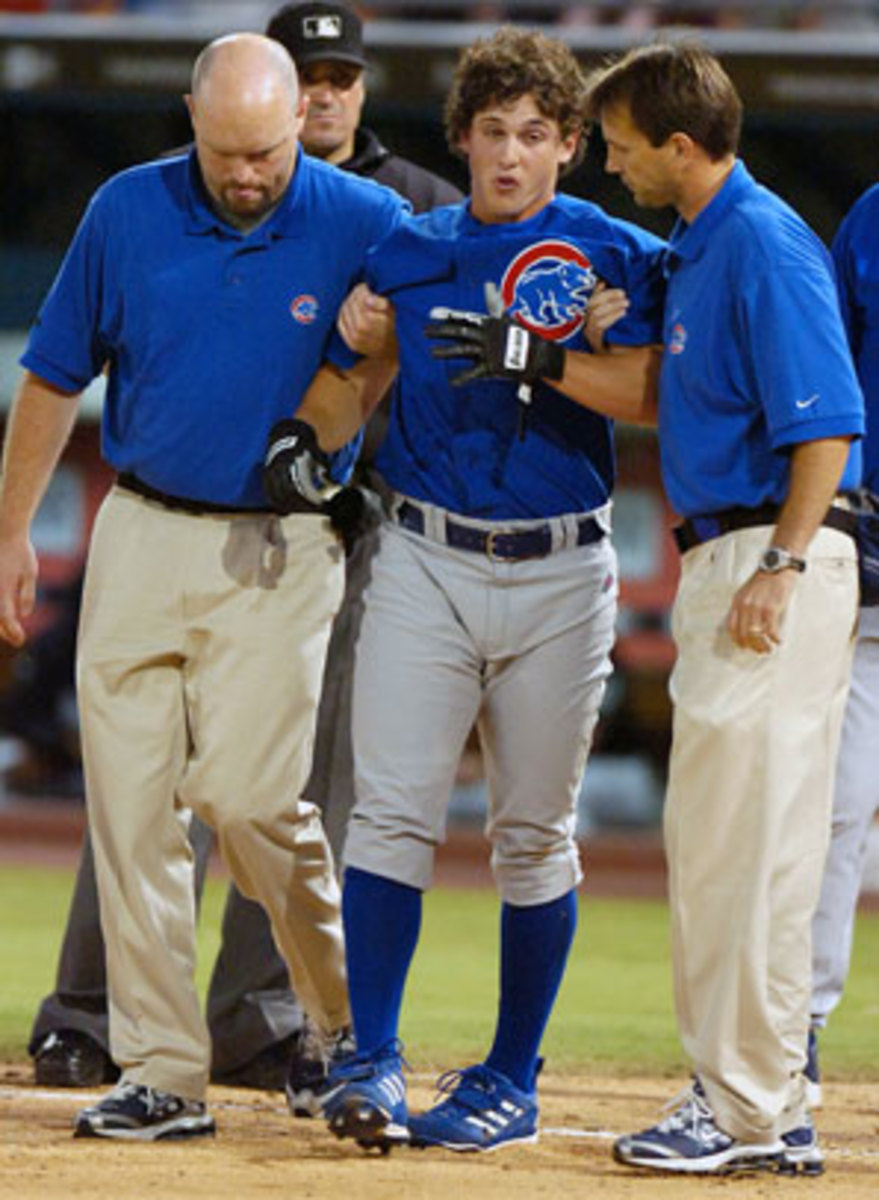
My seven-year quest to get one more at-bat in the major leagues
On July 9, 2005, Adam Greenberg stepped into the batter's box at Dolphins Stadium for his first major league at-bat. Greenberg, then 24, had been a promising prospect for the Cubs ever since they had selected him in the ninth-round of the 2002 draft out of North Carolina three years earlier. He rose steadily through Chicago's minor league system and was batting .269 with a .386 on-base percentage and 15 steals in 19 attempts at Double-A West Tennessee when he was promoted to the parent club.
He came to the plate as a pinch-hitter with one out in the top of the ninth and the Cubs leading 4-2. The first pitch from Florida's Valerio de los Santos was a high fastball that smashed into Greenberg's helmet and made contact with his skull. Greenberg walked off the field under his own power but had no way of knowing that he had suffered a concussion or that he had just faced his only major league pitch.
Until tonight. More than seven years after that one-pitch at-bat that earned him a rare place in baseball history as the only player to be hit by the only pitch he ever saw in the major leagues, Greenberg was signed to a one-day contract by the Marlins last week. The team announced it will get him into tonight's game against the New York Mets at Marlins Park. Greenberg, now 31, tells his story in his own words.
The only time I think abut the at-bat is when people ask me questions. I dismissed it a long time ago based on having to live it and deal with it in order to get over it. I wanted to get back on the field and get back to playing. It was really important to me that I not accept "Oh well, poor me." I always used it as fire, just like when I was just a little kid and I had that fire to reach the majors. I never really got to live my dream in playing in the major leagues. So I used it as fuel to keep that fire burning.
I never really felt like I wasn't going to make it back. That was what enabled me to keep going. But over the years there were points that have been difficult. The toughest probably came in 2009. I had left the Cubs organization in 2006 and spent time in the Dodgers', Royals' and Angels' systems since then, as well as played independent league baseball. But that year I had gone to spring training with the Reds and played well enough that they told me that if I continued to play the way I had I would get a shot at the big leagues, possibly even that year. I was at an all-time high from any point since the injury.
One day toward the end of camp I went to the park and someone grabbed me and said, "They want to see you upstairs before you get dressed." Everyone in baseball knows what that means. They don't tell you to go upstairs before you get dressed unless it's bad news. My heart sank. I thought, really? Again? It took them 10 seconds to release the guy in front of me. When I went in, they shut the door and everybody in the room said, "You earned your shot, you deserve to play at the big league level but unfortunately there's a business side to this and there's only so many guys you can have on the roster." I was the odd man out. I wasn't under contract. I had to walk across the field that day with my bags packed going, "How did this happen again?"
A few weeks later, while playing for Bridgeport in the independent Atlantic League I tore my rotator cuff 90 percent of the way through diving for a ball. It really affected my swing; I couldn't hit through the ball with the swing that I normally would have. I wound up hitting .248 that year, which was my worst season for any season in professional baseball. At the same time, I had started a software development company because I had to. I was only making $2,200 a month for five months, had no health insurance and had just gotten married. I wasn't 100 percent into the game mentally, which you have to be if you're going to succeed.
I had a solid season in 2010 and when I came back in 2011 I felt like this was it. I was physically ready, but even though I thought I was mentally ready, I really wasn't. There were times my first at-bat of the game would happen, I'd go 0-for-1 and only then would I get my head in the game.
This past February I had a heart-to-heart with Dusty Baker at his house in California. He was my manager during my one-game call-up with the Cubs, and he had been my manager in spring training in 2009 with the Reds. In 2008, a fan had written him a letter after I got cut by the Royals, telling him my story, and Dusty read the letter and went out of his way to find me and left me the most heartfelt message I've ever received. He and I had been in touch ever since and I can't rave enough about him as a human being.
When we spoke at his house, I told him everything that had happened to me and he knew that I had started some businesses off the field. He said, "You owe it to yourself to start your life. You can play at the major league level. But you've gone the independent route. Start your life. Don't give up on your dream but do what you need to do for yourself and your family. Get your head clear and good things will come of it."
That was what I needed to hear. I chose to take the year off. That was when Matt Liston called me. He's a filmmaker and lifelong Cubs fan who knew about my story and told me about this army of people he was building to get me back in the major leagues.
I had never heard of him until he called. He told me, "I followed your story I'm a lifelong Cubs fan. I have a mission to get you back to the big leagues and get you an at bat." To be honest, I didn't dismiss it because I heard the passion in his voice. For an optimist and someone who believes anything's possible, did I really believe it would happen this way? Absolutely not.
At some point, the petition Matt was pushing got some media attention and there was a moment in the trailer Matt has made where general manager Jed Hoyer says they owed me a look, but I never spoke to anyone in the Cubs organization and didn't expect it. They didn't owe me anything, not even a phone call.
Talking to Matt and him telling me what he was doing re-lit that passion in me. And that's when I realized that playing baseball is what I still want to do. In July, I got an e-mail from longtime major league catcher Brad Ausmus asking me if I was interested in playing for Team Israel in the qualifying round of the World Baseball Classic.
I had to relearn what it meant to be a big league hitter. I hit until my hands bled and worked with a former hitting coach of mine. By the time of my first batting session with Team Israel, I knew Ausmus was looking at me and saying, "This kid can hit." I was so happy because I was excited about what was going on. I made the team and played in a few games but didn't get an at-bat. We were eliminated on Sept. 23 by Spain in extra innings and I was heartbroken.
After that game, which was at Roger Dean Stadium, the spring training home of the Marlins, I happened to be with Matt and was mic'd up when he got a call from David Samson, the team president. Matt said, "Let me put you on speakerphone." Mr. Samson told me that he had been at that game seven years ago and he'd been following my story and that the organization wanted to give me a one-day contract to get my at-bat. I broke down. I couldn't even say thank you.
I've been so busy the last few days getting ready for this that I'm exhausted at the end of the day. Now that the day is here, I have to treat it like it's a regular game, but it is pretty cool and I'm trying to soak it all up. I'm going to enjoy every second of batting practice. When my at-bat comes, it will probably be against R.A. Dickey, who's having a great season and I hope he wins the Cy Young Award. But I have to play it like it's a regular game. This is a competition. There's no greater thing in the world than playing baseball, and that's what this is all about.
I hope to get on base and score a run, however it takes, whether by base hit, walk, even another hit by pitch. If that happens, hopefully this time I can at least run the bases.































